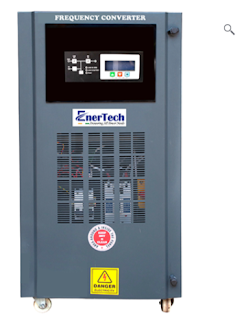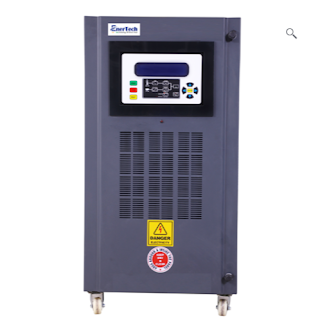In the quest for sustainable energy solutions, hybrid solar inverters have emerged as a pivotal technology, revolutionizing how we harness and manage solar energy. In this article, we delve into the multifaceted world of hybrid solar inverters, exploring their functions, advantages, and diverse applications. Let's embark on a journey to uncover the potential of these remarkable devices.
How a Hybrid Solar Inverter Works
Solar Energy Input:
At the heart of a hybrid solar inverter lies its ability to convert solar energy into usable electricity. Photovoltaic (PV) panels capture sunlight and generate direct current (DC) electricity. The inverter's first task is to convert this DC power into alternating current (AC), which is the standard form of electricity used in homes and businesses.
Grid Connection:
Unlike traditional solar inverters, hybrid solar inverters offer a unique feature: the ability to connect to the electrical grid. This connection serves multiple purposes, such as enabling the export of excess energy to the grid and ensuring a reliable power supply when solar generation is insufficient.
Battery Integration:
One of the distinguishing features of hybrid solar inverters is their compatibility with energy storage systems, typically lithium-ion batteries. These batteries store excess energy generated during the day for use during the night or during power outages, enhancing energy independence.
Conversion Process:
The core function of a hybrid solar inverter is to manage the flow of electricity between solar panels, batteries, and the grid. It intelligently prioritizes energy sources, seamlessly switching between solar power, battery storage, and grid electricity as needed to optimize efficiency and cost savings.
Advantages of Hybrid Solar Inverters:
Energy Independence:
Hybrid solar inverters empower homeowners and businesses to reduce their reliance on the grid. By storing excess solar energy in batteries, users gain a degree of energy independence, ensuring a continuous power supply even in the absence of sunlight or during grid failures.
Efficiency and Cost Savings:
These inverters maximize energy efficiency by intelligently balancing energy sources. Excess solar energy can be stored and used during peak demand periods, reducing reliance on costly grid electricity. This translates into significant long-term cost savings.
Grid Stability:
Hybrid solar inverters contribute to grid stability by reducing the strain on the electrical grid during periods of high energy demand. They can also support the grid by feeding excess energy back into it, creating a win-win scenario for users and utility companies.
Environmental Benefits:
Embracing hybrid solar inverters aligns with environmental sustainability goals. By optimizing solar energy usage and reducing grid dependence, these devices help reduce carbon emissions and minimize the ecological footprint of energy consumption.
Key Considerations When Choosing a Hybrid Solar Inverter:
System Size and Capacity:
Selecting the right inverter size and capacity is crucial. It should match the solar panel array's size and the energy demands of the household or business. Oversizing or undersizing the inverter can lead to inefficient operation.
Battery Compatibility:
When integrating battery storage, ensure that the chosen inverter is compatible with your preferred battery technology. Compatibility issues can hinder the seamless operation of the system.
Monitoring and Control Features:
Modern hybrid solar inverters offer advanced monitoring and control features. Look for options that provide real-time data on energy production, consumption, and battery status. This information empowers users to make informed decisions about their energy usage.
Warranty and Support:
Investigate the warranty and support options offered by the inverter manufacturer. A robust warranty and accessible customer support are essential for long-term peace of mind.
Installation and Maintenance:
Proper Installation Practices:
The installation of a hybrid solar inverter is a critical phase in ensuring its long-term performance. It's advisable to enlist the services of certified and experienced solar installers who can ensure the inverter is correctly integrated into your solar energy system. Proper installation minimizes the risk of compatibility issues and safety concerns.
Routine Maintenance Guidelines:
Hybrid solar inverters are relatively low-maintenance devices, but regular upkeep is essential to maximize their lifespan. Routine checks should include inspecting for dust or debris accumulation, monitoring connections for signs of wear or corrosion, and ensuring the battery system's health. Most manufacturers provide maintenance guidelines in their user manuals to guide users in this regard.
Troubleshooting Common Issues:
Despite their reliability, hybrid solar inverters may encounter occasional issues. These could range from communication problems between components to battery performance concerns. Familiarizing yourself with troubleshooting procedures can help identify and resolve issues promptly, reducing downtime and ensuring continuous energy supply.
Hybrid Solar Inverters in Residential Applications:
Backup Power for Homes:
One of the most compelling advantages of hybrid solar inverters for residential users is the ability to provide backup power during outages. When the grid goes down, the inverter seamlessly switches to battery power, keeping essential appliances and lights running, offering peace of mind during storms or other emergencies.
Off-Grid Living:
For those seeking full energy independence, hybrid solar inverters can facilitate off-grid living. By combining solar panels, batteries, and an inverter, homeowners can generate and store their electricity, reducing reliance on external sources entirely.
Maximizing Self-Consumption:
Hybrid solar inverters empower homeowners to maximize self-consumption of solar energy. The excess solar power generated during the day can be stored for nighttime use or used during peak demand hours, reducing electricity bills and increasing the return on investment.
Commercial and Industrial Use Cases:
Business Continuity:
In commercial and industrial settings, hybrid solar inverters play a crucial role in ensuring business continuity. They can provide uninterrupted power to critical equipment and processes, preventing costly downtime during power outages.
Peak Shaving and Demand Management:
Hybrid solar inverters enable businesses to implement peak shaving strategies, reducing peak power demand from the grid. This not only lowers electricity costs but also contributes to grid stability by alleviating strain during peak hours.
Sustainability Initiatives:
Many businesses are committed to sustainability and reducing their carbon footprint. Hybrid solar inverters facilitate the integration of renewable energy sources, aligning with corporate sustainability goals and enhancing the environmental profile of commercial operations.
Future Trends in Hybrid Solar Inverters:
Integration with Smart Grids:
As smart grid technology advances, hybrid solar inverters are likely to become even more integrated into grid management systems. This integration will enable more efficient energy sharing between households and businesses, promoting grid stability and optimizing energy usage.
Energy Management Solutions:
Hybrid solar inverters will continue to evolve with enhanced energy management capabilities. This includes better integration with home automation systems, allowing users to control their energy consumption in real-time and adapt to changing energy prices.
Technological Advancements:
Advancements in battery technology, energy storage, and inverter design will further enhance the efficiency and performance of hybrid solar inverters. Expect to see more compact, efficient, and user-friendly solutions in the market.
In conclusion, hybrid solar inverters represent a pivotal advancement in the realm of renewable energy. These versatile devices provide energy independence, cost savings, and environmental benefits for residential, commercial, and industrial users alike. With the continued evolution of technology and growing awareness of sustainability, hybrid solar inverters are set to play an increasingly significant role in our energy landscape.


